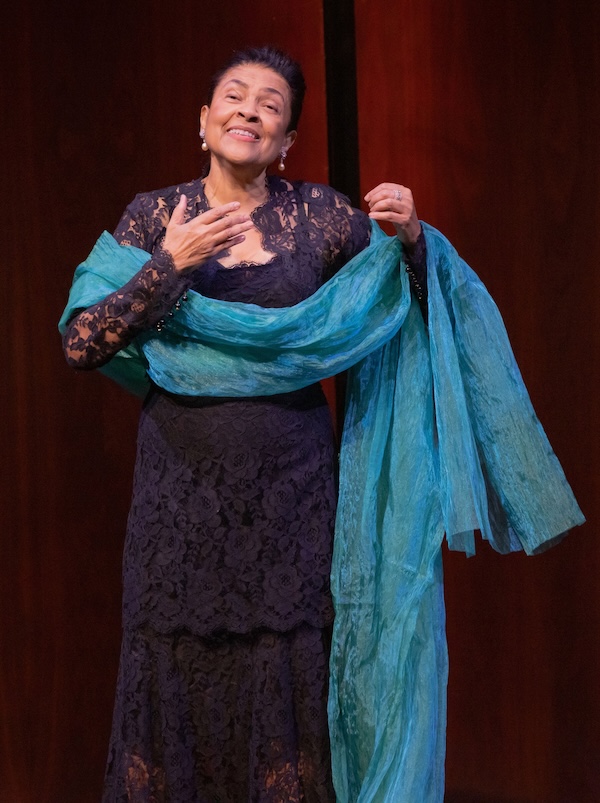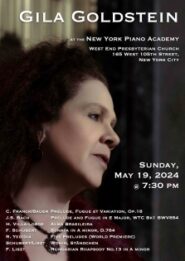Performances
The Sebastians wrap season with a fiddle feast of Lully and friends
Before Beethoven, what we now call classical music was all new […]
Musical worlds coalesce and diverge in Wang’s Carnegie recital
If Yuja Wang’s intention for the first half of her Carnegie […]
Hobson’s Schumann series turns to chamber works with mixed results
Friday evening’s concert at the Tenri Cultural Institute by pianist Ian […]
LOTNY’s puppet opera serves up Haydn in plain and charming sight
There seem to be ever more puppets showing up in opera […]
The best of Baroque times with Opera Lafayette’s tale of two Esthers
The 2024 celebration of Purim, centered on the biblical story of […]
Articles
Top Ten Performances of 2023
1. Pierre-Laurent Aimard in music of Ligeti, Beethoven, Chopin and Debussy. […]
Critic Picks for 2023-24
“Dopplegánger.” Jonas Kaufmann and Claus Guth. Park Avenue Armory. September 22-28. […]
Concert review
Battle returns to the Met with touching glimpses of past vocal glory

There were no sold-out banners across the marquees announcing Kathleen Battle’s recital outside the Metropolitan Opera on Sunday. Once inside the house, however, there was nary an empty seat to be seen.
It was the soprano’s first appearance at the Met since she performed Underground Railroad: A Spiritual Journey there in November 2016. Her return undoubtedly was due to her long-standing professional relationship with Peter Gelb, the Met’s general manager. Prior to coming to the Met in 2006, Gelb was president of Sony Classical Records, the label for which Battle recorded many of her finest and most popular releases.
Without Gelb as her champion, Battle would likely never have again graced the stage of the Met. In the early 1990s, Battle earned a reputation for being difficult and demanding. In February 1994, Joseph Volpe, Gelb’s predecessor, dismissed her for unprofessional behavior during rehearsals for an upcoming production of La fille du régiment. Battle never appeared in opera again.
This concert was conceived by Robert Sadin, who has been instrumental in the soprano’s career since she was a student at the University of Cincinnati Conservatory of Music over 50 years ago. He urged her to work with young people, which prompted this collaboration with harpist Bridget Kibbey and guitarist Chico Pinheiro for this recital. The delicate sounds of their instruments proved the ideal accompaniment for Battle’s voice with balance never an issue.
It was as much, perhaps more, a celebration of a beloved artist, than a musical experience. A less sympathetic audience would have undoubtedly bristled at Battle’s quirky behavior. There were prolonged breaks between songs, excessive rustling of pages as she sorted through music, and the prodding of Kibbey and Pinheiro to either play louder or reposition themselves for reasons unbeknownst to the audience.
Battle’s diva allure and demeanor remain intact. She accessorized her elegant black-lace dress with two enormous shawls, one in turquoise and the other in violet. She rearranged them repeatedly and preened before the audience, which drew appreciative applause from many. Her switch from black to red-sparkling shoes for the second half of the concert prompted a shout-out from one enthusiastic fan.
There were many in the audience who remember Battle at the Met in roles such as Rosina in The Barber of Seville, Sophie in Der Rosenkavalier, and Susanna in The Marriage of Figaro. Then her voice was sparkling and crystalline with roulades and runs perfectly executed. She was always an engaging presence on stage due to her diminutive, almost doll-like appearance and perkiness.
Now 75, Battle still has charisma, but her voice is, understandably a shadow of what it once was. Yet she programmed songs for the singer of former days. Her ability to beguile an audience by one means or another was as impressive as always. Intonation though could be hit or miss and shortness of breath was masked with finesse.

Battle entered the stage to a standing ovation as Kibbey and Pinheiro played a rather spicy introduction to Purcell’s “Music for a while.” In it, as in “O, sleep why dost though leave me?” from Handel’s Semele, her voice was tiny and almost childlike in sound. Battle’s wit and a somewhat fuller tone served her well in Purcell’s “Man is for the woman made.”
In songs such as Schubert’s “Seligkeit,” Mendelssohn’s “Auf Flügeln des Gesanges,” and Reynaldo Hahn’s “Si mes vers avaient des ailes,” vocal muscle-memory seemed to kick in revealing glimpses of Battle’s voice in its prime. Her sound was suddenly richer and more vibrant. The Hahn in particular permitted Battle to float beautiful high-flying phrases with impressive ease.
Battle began the second half of the recital with the Ária from Heitor Villa-Lobos’s Bachianas Brasileiras No. 5, which here was more a showcase for guitar and harp, than it was for the soprano. She graced it with some lovely, floating phrases, but Kibbey and Pinheiro provided the real musical interest through their combination of subtle playing and elegant style.
The selection of Spanish songs which followed were also a mixed bag. If Battle found the perfect placement for the first note or two, the voice was heard at its best. Otherwise, it emerged thin and wan. The successes were Joaquín Rodrigo’s “De los álamos vengo, madre” and Jaime Silva and Neuza Teixeira’s “O Pato” with which she ended the recital. This was Battle fun and light as she quacked like a duck.
Kibbey was afforded a solo spot performing her arrangement for harp of Bach’s Toccata and Fugue in D minor. It showcased not only the harpist’s virtuosity, but also her ability to draw dark, complex sounds from her instrument. Pinheiro was heard solely in his role as collaborator, but his playing consistently provided atmosphere, color and rhythmic vitality.
Battle ended the recital with a rousing rendition of “Ain’t That Good News” and a tender and moving “Heaven Is One Beautiful Place” which she sang without accompaniment. She returned for two encores, an unannounced Spanish song and “Swing Low, Sweet Chariot.” In the spiritual, she again sang alone center stage embraced by the audience with admiration and affection.
Calendar
May 13
Theodor Leschetizky: Souvenir de Venise
Arensky: Piano Trio No. 2 […]
News
Met’s 2024-25 season will bring new “Aida” and “Salome,” four contemporary operas
The Metropolitan Opera will continue its expansion into contemporary opera in […]
Carnegie Hall to mix Latin music with cornerstone favorites in 2024-25
Carnegie Hall executive and artistic director Clive Gillinson introduced the 2024-2025 […]


